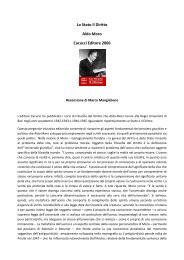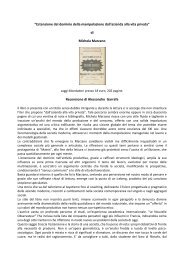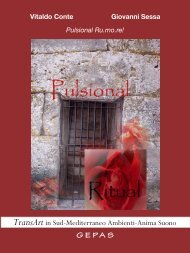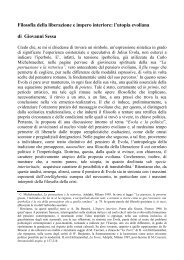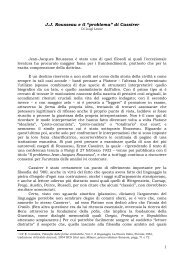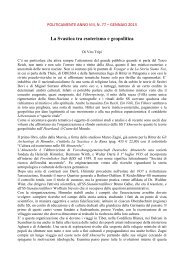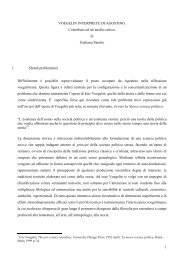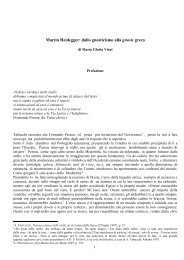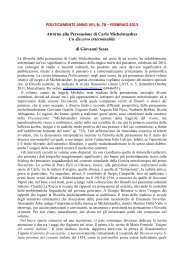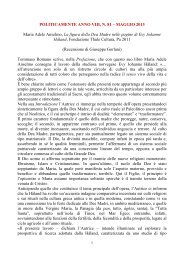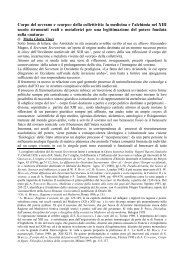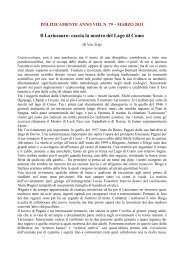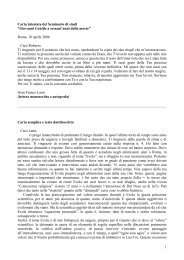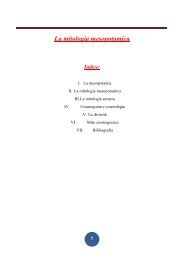Paolo Cevasco Przywara in Voegelin: un «flux of ... - PoliticaMente
Paolo Cevasco Przywara in Voegelin: un «flux of ... - PoliticaMente
Paolo Cevasco Przywara in Voegelin: un «flux of ... - PoliticaMente
You also want an ePaper? Increase the reach of your titles
YUMPU automatically turns print PDFs into web optimized ePapers that Google loves.
Pag<strong>in</strong>a 6 di 9<br />
»Was denn ist, wenn nicht weil Du bist« [Conf. XI 5;7]. Und darum »ist« der Mensch,<br />
<strong>in</strong>dem er, »sich weghebend von sich selbst« [Serm. 169 9;11], mit se<strong>in</strong>em ganzen Leben <strong>in</strong><br />
Gott h<strong>in</strong>e<strong>in</strong> verschaut ist: »dann ‚ist’ er, wann er Gott schaut« [Enarr. <strong>in</strong> Ps. 121;8]. So wird<br />
das Nichts se<strong>in</strong>es steten Übergangs von Vergangen zu Künftig e<strong>in</strong> Übergang vor Gott <strong>un</strong>d<br />
durch Gott» 19<br />
«The center <strong>of</strong> consciousness I fo<strong>un</strong>d to be the experience <strong>of</strong> participation, mean<strong>in</strong>g<br />
thereby the reality <strong>of</strong> be<strong>in</strong>g <strong>in</strong> contact with reality outside myself. (…) If man were not<br />
consubstantial with the reality that he experiences, he could not experience it. (…) I fo<strong>un</strong>d<br />
that the same type <strong>of</strong> analysis had been conducted on a much vaster scale by Plato, result<strong>in</strong>g<br />
<strong>in</strong> his concept <strong>of</strong> the metaxy – the In-Between. The experience is neither <strong>in</strong> the subject nor<br />
<strong>in</strong> the world <strong>of</strong> objects but In-Between, and that means In-Between the two poles <strong>of</strong> man<br />
and <strong>of</strong> the reality that he experiences» 20<br />
Ora che l’<strong>in</strong>fluenza przywariana prende a del<strong>in</strong>earsi come <strong>un</strong>a presenza nutritiva nei paraggi di<br />
tutte o quasi le parole chiave che conducono al cuore dell’opera di Voegel<strong>in</strong>, non può stupirci il<br />
fatto che sempre <strong>in</strong> Christliche Existenz questa costituzione della persona umana e della com<strong>un</strong>ità di<br />
persone come ricettività rispetto alla grazia, sia posta <strong>in</strong> palese relazione con la com<strong>un</strong>ità <strong>in</strong>tesa<br />
come organismo e la f<strong>un</strong>zione metafisico-politica della rappresentanza:<br />
«Das je e<strong>in</strong>zelne Geschöpf ist nicht dazu da, entweder das All um sich <strong>un</strong>d <strong>in</strong> sich zu<br />
zentrieren oder als das Nichts der eigenen Leere dazuliegen. Sondern gerade der<br />
»Mikrokosmos«, den der Mensch <strong>in</strong> se<strong>in</strong>er <strong>in</strong>neren Spanne zwischen Geist <strong>un</strong>d St<strong>of</strong>f<br />
darstellt, ist, wie Thomas von Aqu<strong>in</strong> sagt, e<strong>in</strong> »gleichsam All« nur »gemäß S<strong>in</strong>nlichkeit <strong>un</strong>d<br />
Verstand« [S. Th. 1 q. 80 a 1 corp], d.h. <strong>in</strong> der leidentlichen Weise des Geformtwerdens, die<br />
gerade im Geistesleben des Menschen ihren Höhep<strong>un</strong>kt hat, das im Vergleich zum re<strong>in</strong>en<br />
Geist e<strong>in</strong>e restlose Leidentlichkeit ist, nach Art der »materia prima« [S. Th. 1 q. 14 a 2 ad 3],<br />
<strong>un</strong>d <strong>in</strong> se<strong>in</strong>em relativ Schöpferischen gerade <strong>in</strong> die materiellen D<strong>in</strong>ge geb<strong>un</strong>den ist, der<br />
Enthüll<strong>un</strong>g ihres re<strong>in</strong>en Wesens [<strong>in</strong> der Ab-straktion] zu dienen [S. Th. q. 79 a 4 ad 4]. So<br />
heißt Totalität des Menschen das restlose H<strong>in</strong>zu zur Totalität der Geme<strong>in</strong>schaft <strong>un</strong>d so zur<br />
Totalität des All. (…)Vor dem Deus Totus steht mith<strong>in</strong> eigentlichst die Totalität der<br />
Geme<strong>in</strong>schaft der Geschöpfe, so sehr, daß »Gott e<strong>in</strong> jedes Geschöpf machte im Maß<br />
angepaßt dem All, das zu machen Er verfügte« [S. Th. 1 q. 56 a 2 ad 4], daß darum dem<br />
»Gut des All« als dem »Gut der Ordn<strong>un</strong>g« »alle Geschöpfe <strong>un</strong>terliegen, weil sie von Gott<br />
hervorgebracht s<strong>in</strong>d« [De malo q. 16 a 9 corp.]. »Ordn<strong>un</strong>g zum All« <strong>un</strong>d »Ordn<strong>un</strong>g zu<br />
Gott« s<strong>in</strong>d so eng zu e<strong>in</strong>ander, daß nicht nur »die Ordn<strong>un</strong>g der Teile des All zu e<strong>in</strong>ander<br />
durch die Ordn<strong>un</strong>g des All-Ganzen zu Gott ist« [De potentia q. 7 a 9 corp.], sondern auch<br />
»Gott…das All der Geschöpfe will se<strong>in</strong>er selbst willen, wenngleich Er es auch Se<strong>in</strong>er Selbst<br />
willen wesen will« [De potentia q. 5 a 4 corp.]. Auch noch der <strong>in</strong> sich-selbst all-hafte Geist<br />
ist zuletzt gliedhaft fremdzwecklich zur E<strong>in</strong>en Totalität der Geme<strong>in</strong>schaft des All. Nur<br />
dieses totale All selber verschwimmt geheimnisvoll mit der E<strong>in</strong>en Selbstzwecklichkeit des<br />
Deus Totus. Und darum ist nicht das der S<strong>in</strong>n des Menschen, negativ ernüchtert zu werden<br />
<strong>un</strong>d sachlich <strong>un</strong>d erdhaft: aus dem angemaßten Bewußtse<strong>in</strong> souveräner <strong>in</strong>nerer Ganzheit <strong>in</strong><br />
die Wahrheit des Stückse<strong>in</strong>s <strong>un</strong>d Leer-se<strong>in</strong>s <strong>un</strong>d Ausgeliefert-se<strong>in</strong>s des »re<strong>in</strong>en Gliedes«.<br />
19 E. <strong>Przywara</strong>, Christliche Existenz, Jakob Hegner, Leipzig 1934, p. 24: «Proprio perchè l’esistenza della creatura è <strong>in</strong> se stessa<br />
«nulla», è possibile <strong>un</strong>icamente <strong>un</strong> esistere a partire da «sopra di sé»: a partire da Dio. «L’uomo <strong>in</strong> se stesso», dice Agost<strong>in</strong>o, «non<br />
è…se non nella misura <strong>in</strong> cui partecipa di Colui che è colui che è» [«Quia homo <strong>in</strong> se non est: mutatur enim et vertitur, si non<br />
participet eius qui est idipsum»], Enarr. <strong>in</strong> Psalmos 121.8». «Che cosa mai esiste, se non perché Tu esisti?» [«Quid enim est, nisi<br />
quia tu es?»], Conf. XI 5.7. E l’uomo è solo <strong>in</strong> virtù di ciò, ossia per il fatto che «<strong>in</strong>nalzandosi al di sopra di sé» [«Tolle, <strong>in</strong>quam…te<br />
a te»], Sermo 169, 9.11, con tutta la sua vita si fissa amorosamente nella contemplazione di Dio; «egli è quando vede Dio» [«T<strong>un</strong>c<br />
est, quando videt Deum.»], Enarr. <strong>in</strong> Ps. 121.8. In tal modo il niente del suo cont<strong>in</strong>uo trapassare dal passato al futuro diventa <strong>un</strong><br />
trascendere attraverso Dio e davanti a Dio.» [tr.ns.] È forse da riguardarsi come semplice co<strong>in</strong>cidenza il fatto che l’Enarratio sul<br />
Salmo 121 applica questa ontologia del vedere mistico e della ricettività rispetto alla grazia non all’esperienza del raccoglimento<br />
<strong>in</strong>dividuale, ma all’esistenza dentro la storia sacra dell’Israele storico, com<strong>un</strong>ità sovrana, almeno per <strong>un</strong> certo tempo, ed<br />
escatologicamente orientata, ma anche – e come può essere diversamente <strong>in</strong> piena età dell’esegesi figurale? – figura di quel corpo<br />
mistico la cui dapprima fiorente e poi massacrata auctoritas rappresentativa forma il Gr<strong>un</strong>dthema di Voegel<strong>in</strong> da Die politischen<br />
Religionen f<strong>in</strong>o alle ultime righe che scrisse alle soglie della morte?<br />
20 E. Voegel<strong>in</strong>, Autobiographical reflections, cit., p. 98.



